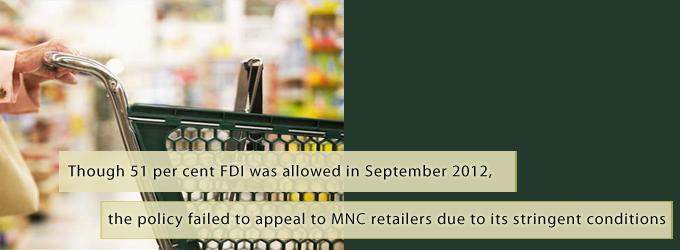|
FDI in multi-brand retail is an issue no political party worth its salt would like to discuss openly. Most politicians, while privately admitting that FDI in multi-brand retail is good for India because it will ensure faster and efficient supply of goods -- especially agro products across the country -- openly desist from supporting the move.

This political ambivalent stance has forced a number of global retailers with firm plans to invest in India, to hold back their plans at least for a while. However, some of the MNCs like Walmart seem to be optimistic about getting a political nod for their huge investment plans in India. A day after the release of the BJP manifesto, which has barred FDI in multi-brand retail, Walmart announced its plans to set up 50 cash-and-carry stores in the next four-five years, adding to its current tally of 20 stores. The initial outlets are expected to be opened in Maharashtra and Andhra Pradesh. The cash-and-carry format stores are typically large stores that allow bulk or wholesale purchases at discounts for small traders or stores. At present, 100 per cent FDI is allowed in cash-and-carry format. Carrefour is another global retailer which has opened cash and carry stores in India.
Foreign investment in the single-brand retail format has picked up steadily since January 2012, when India allowed 100 per cent FDI in this sector. So far, the government has approved proposals of IKEA, Decathlon, Fossil, Pavers England, Le Creuset etc, for setting up retail shops.
The same enthusiasm was not seen in setting up multi-brand retails shops in India. Though 51 per cent FDI was allowed in September 2012, the policy failed to appeal to MNC retailers due to its stringent conditions. To make things a little easier, the Consolidated FDI Policy released in April 2013 somewhat diluted the investment conditions. The policy relaxed rules governing the sourcing of products, infrastructure investment and selection of cities. However, confusion with regards to these norms, especially with the 30 per cent local sourcing criteria, is sill prevalent.
The Union Government has allowed states the discretion to decide whether or not to allow FDI in multi-brand retail. Till date, only 12 states, including Maharashtra, Karnataka and Andhra Pradesh have agreed to allow global retailers to open supermarket chains under the policy. To make matters worse, the new governments in Delhi and Rajasthan withdrew their approval for FDI in multi-brand retail in January 2014.
So far, UK’s Tesco is the only foreign retailer that has tied up with a local retailer, Trent -- a unit of Tata Sons -- to open stores in India. Tesco entered into an agreement with Trent to form a 50:50 joint venture in Trent Hypermarket (THL) in March 2014. THL operates the Star Bazaar retail business in India. The Foreign Investment Promotion Board cleared Tesco’s proposal in December 2013. On completion of the transaction THL will operate 12 stores retailing food and grocery, personal and home-care products, home appliances, fashion, and accessories, etc. The Department of Industrial Policy and Promotion (DIPP), the nodal agency for FDI, has not received any other application for multi-brand retail after Tesco’s $110 million proposal.
The size of the Indian retail sector is estimated at around $500 billion. At present, it is a very fragmented and largely uncontrolled sector. ProjectsToday believes that allowing MNCs with certain caveat will help both, the suppliers of goods and the consumers.
|